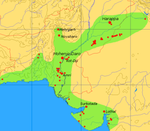Portal:India/Today's selected article/May 15, 2006
| This page is currently inactive and is retained for historical reference. Either the page is no longer relevant or consensus on its purpose has become unclear. To revive discussion, seek broader input via a forum such as the village pump. |
Lothal was one of the most prominent cities of the ancient Indus valley civilization. Located in the modern state of Gujarat and dating from 2400 BCE, it is India's most important archaeological site that dates from that era. Lothal's dock—the world's earliest—connected the city to an ancient course of the Sabarmati river on the trade route between Harappan cities in Sindh and the peninsula of Saurashtra when the surrounding Kutch desert of today was a part of the Arabian Sea. It was a vital and thriving trade centre in ancient times, with its trade of beads, gems and valuable ornaments reaching the far corners of West Asia and Africa. Discovered in 1954, Lothal was excavated from February 13, 1955 to May 19, 1960 by the Archaeological Survey of India (ASI). A major part of the township and dockyard were unearthed. Resuming excavation in 1961, archaeologists unearthed trenches sunk on the northern, eastern and western flanks of the mound, bringing to light the inlet channels and nullah ("ravine", or "gully") connecting the dock with the river. The findings consist of a mound, a township, a marketplace and the dock. Adjacent to the excavated areas stands the Archaeological Museum, where some of the most prominent collections of Indus-era antiquities in modern India are displayed.
- The selected article for this day has not been chosen yet. See Portal:India/Today's selected article for guidelines.
Recently appeared: Hindi – Jawaharlal Nehru – Himalaya

